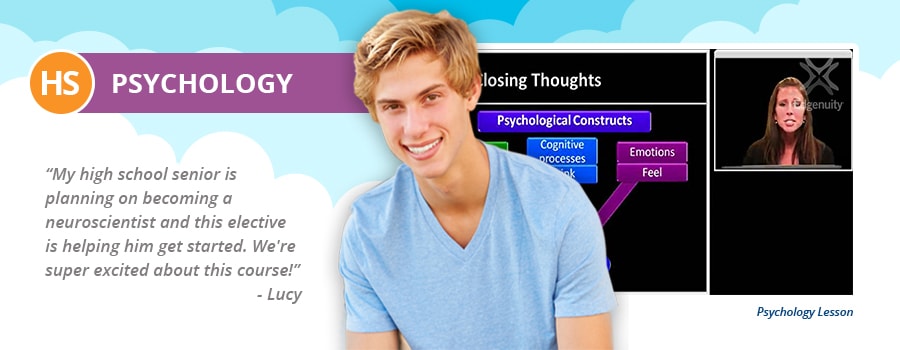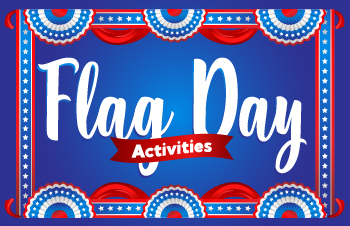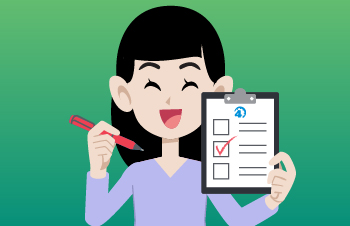High School Psychology Curriculum
High school psychology is an elective course that aims to give students an understanding of human behavior. Psychology classes for high school students typically cover several important aspects such as the history of psychology, research methods, classification and treatment of disorders, and more.
This page includes helpful information on what you can expect your child to learn with Time4Learning’s homeschool psychology elective course, why the study of psychology is important, and more.
Why Study Psychology in High School?
There are many reasons to study high school psychology. In addition to gaining a number of social and emotional learning skills that promote positive mental health, a high school psychology curriculum helps students academically by teaching them important research skills.
The concepts covered in a high school psychology curriculum also help students deal with and process feelings they are experiencing as they pertain to their own identity, relationships, and so much more.
As they learn about human development, different personality types, and social interactions, students are able to better understand a number of behaviors and emotions, and why people (including themselves) think the way they do and why they make certain decisions.
What Do You Learn in High School Psychology?
High school courses for psychology introduce students to a number of traditional psychological concepts from a number of contemporary perspectives such as biological, psychosocial, and cognitive.
Students typically begin a high school psychology course with an introduction to psychology as well as background information on research methods. Throughout the course, high schoolers will learn about foundational ideas and theories as they analyze human growth and development, the various aspects of learning and intelligence, personality, and behavior.
Students will explore the nature of being human and learn to identify various disorders as well as discuss risk factors and treatments for each one. High school students will also delve into the science of human interactions by exploring topics such as socialization, individual interactions, and group behaviors.
High School Psychology Curriculum Scope & Sequence
- What Is Psychology?
- Psychology’s Modern History
- What Is Research?
- Experimental Design
- Descriptive Research
- Descriptive and Inferential Statistics
- Ethical Research
- Ethical Controversies
- The Neuron
- Structures of the Nervous System
- The Brain
- The Cerebrum
- Brain Research
- Functions of the Endocrine System
- Sensation
- Vision and the Structure of the Eye
- Hearing and the Structure of the Ear
- Touch, Taste, and Smell: The Other Senses
- Pain, Kinesthetic, and Vestibular Senses
- Components of Perception
- Influences on Perception
- Measures of Consciousness
- Sleep
- Dreams
- Hypnosis
- What Is Learning?
- Classical Conditioning
- Operant Conditioning
- Reinforcement and Punishment
- Cognitive and Behavioral Learning Influences
- Social Learning
- The Brain and Memory
- Attention and Processing Information
- Forming Concepts
- Issues with Remembrance and Forgetting
- Research on Memory Reconstruction and Memory Improvement
- Structures of Language
- Learning Language
- Cumulative Exam
- Intelligence Testing
- Theories of Intelligence
- Influences on Intelligence
- Motivation
- Theories of Motivation
- Theories of Emotion
- Factors of Emotion
- Stress Factors
- Stress Responses
- Nature vs. Nurture
- Theoretical Issues in Development
- Prenatal Development
- Physical Development
- Personal and Social Development
- Cognitive Development
- Moral Development
- Adolescence
- Identity Development
- Adulthood
- Influences on Personality Formation
- Assessing Personality
- Trait Perspective
- Psychodynamic Perspective
- Behavioral Perspective
- Humanist Perspective
- Biological Perspective
- Identifying Abnormal Behavior
- Understanding Psychological Disorders
- Seeking Therapy
- Types of Therapy
- Anxiety Disorders
- Somatoform Disorders
- Dissociative Disorders
- Mood Disorders
- Schizophrenic Disorders
- Personality Disorders
- Cumulative Exam
Why Choose Time4Learning’s High School Psychology Curriculum?
Time4Learning’s online psychology course for high school students teaches using an interactive approach that engages students and enhances understanding. The high school psychology course material spans two semesters (one full year) and features lectures, video lessons, study tools, research projects, and interactive resources for students to refer to throughout the course.
In addition to providing a comprehensive education, flexible scheduling, and a self-paced format, Time4Learning’s homeschool curriculum also offers members a number of benefits including:
- 10 chapters with more than 400 activities to help students gain an understanding of the core concepts and theories of psychology.
- Thought-provoking introduction to each lesson activates the student’s prior knowledge.
- Helpful study tools, including an interactive brain anatomy resource and psychology timeline, allow students to dive deeper into the course.
- Graphic organizer helps students make connections and understand how ideas are related.
- An automated grading and recordkeeping system to save parents time as well as various resources to help with homeschooling.
- 24/7 access that allows students to log in anytime, from any device with an internet connection.
- Ability to redo lessons and retake tests and quizzes to help students gain further understanding.
- Activity planners and curriculum calculators that promote independent learning.
- Lesson plans that include detailed information on each activity and give parents the ability to preview lessons.
- Multi-use curriculum can be used as your main homeschool curriculum, for afterschool skill building, or for summer learning.
- Option to add additional courses or change courses at any time so students can review previous material, get a head start, or challenge themselves with new topics.
- Self-paced approach is perfect for all types of learning styles, gifted children or students with special needs.
Additional Electives
- List of Electives Overview
- Environmental Science
- Sociology
- Intro to Communications and Speech
- Art History I
- Concepts in Probability and Statistics
- Intro to Art
- Contemporary Health
- Foundations of Personal Wellness
- Lifetime Fitness
- Strategies for Academic Success
- Healthy Living
- Economics
- Personal Finance
- Computer Applications – Office 2019






